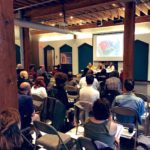- NLG lawyer Molly Armour introduces panelists Ali Simmons and Diane O’Connell, along with moderator Nickolas Caplan.
- A wonderful turnout for our CLE on the criminalization of homelessness.
- Ali Simmons discusses the movement to save the Uptown Tent City, which was largely spearheaded by residents.
- Ali Simmons discusses the importance of listening to homeless individuals already doing work for their own communities.
Although advocating for people experiencing homelessness is an underappreciated area of criminal defense, the support present at the Mass Defense Committee’s April 24th CLE, “The Criminalization of Homelessness,” demonstrates that those without homes in Chicago are not without people dedicated to fighting for their basic human rights. Diane O’Connell, a community lawyer at the Chicago Coalition for the Homeless (CCH) who provides a variety of legal services to people experiencing homelessness, presented along with Ali Simmons, a CCH street outreach worker and community organizer. Nickolas Kaplan, an NLG attorney who was active in providing legal support in the struggle to save the Tent City in Uptown, moderated the event.
The discussion largely focused on the Uptown Tent City, an encampment on the Lake Shore Drive viaduct which experienced consistent government harassment over a period of several years. Some of the major moments of the campaign reviewed by panelists included a large scale eviction of the encampment in September 2017, as well as subsequent direct actions protesting the evictions. Simmons strongly reinforced that such encampments function not only as shelter, but refuges of community and support for the people who live there. As a result, when the city displaces an encampment, people lose their community. For many, encampments are the only viable option for survival due to the lack of availability — and accessibility — of many housing options in the city of Chicago. Accessibility of housing for those with disabilities is one of the many lenses through which Simmons highlighted the intersectional nature of homelessness. He further discussed how those without homes can be more vulnerable both to sexual violence and incarceration after their encampments are displaced.
O’Connell then went on to discuss various legal strategies aimed at supporting the rights of homeless people. A prominent legal avenue for this aid is the Illinois Bill of Rights for the Homeless Act, which provides some protection to homeless people and their property. She emphasized that while a person experiencing homelessness has the right under law to equal treatment without discrimination, in reality the mere fact of homelessness often provides basis for discrimination. Other initiatives of CCH which were discussed included the Bring Chicago Home campaign, a small real estate tax increase which would be used to fund housing increases for communities experiencing homelessness.
Both Simmons and O’Connell underscored the two main points which lawyers should glean from the discussion: first and foremost comes actively listening to the people who are already in the struggle for their own rights; secondly, when working with the homeless community, it is of utmost importance to follow through on any and all commitments given. Being present and forming active partnerships between lawyers and people experiencing homelessness provides a framework for reshaping the outlook on the needs of homeless communities, with an emphasis on intersectionality and the concept of refuge.





